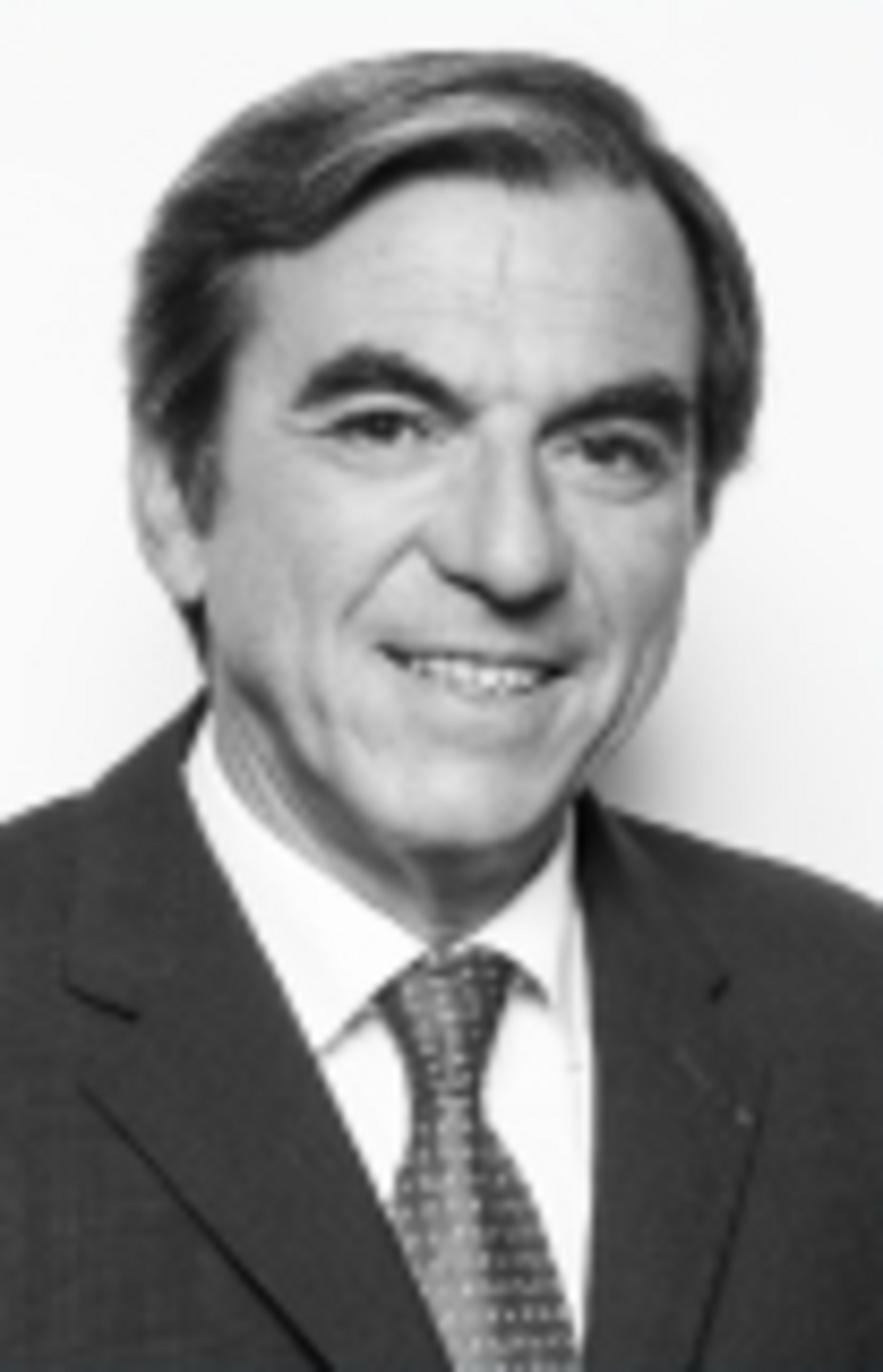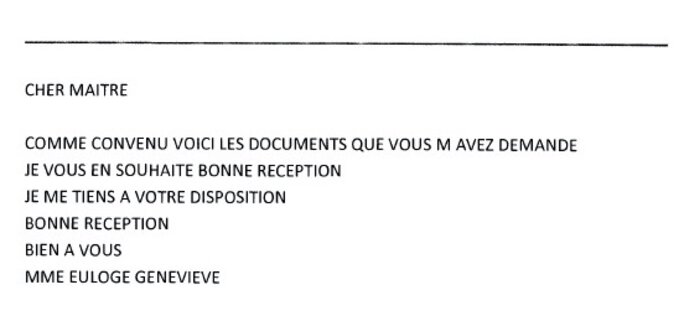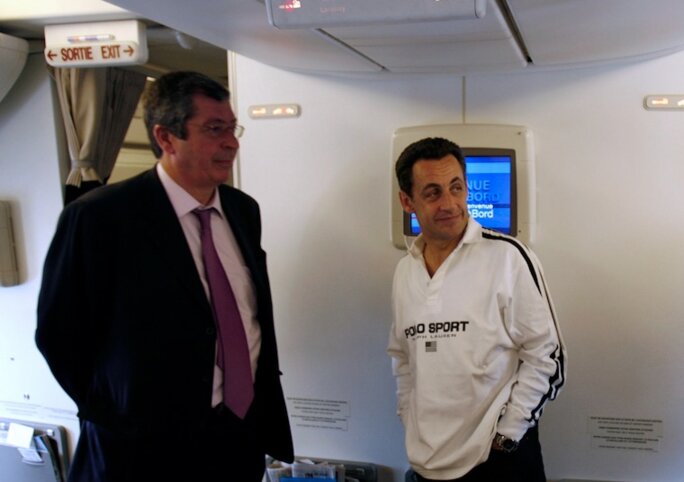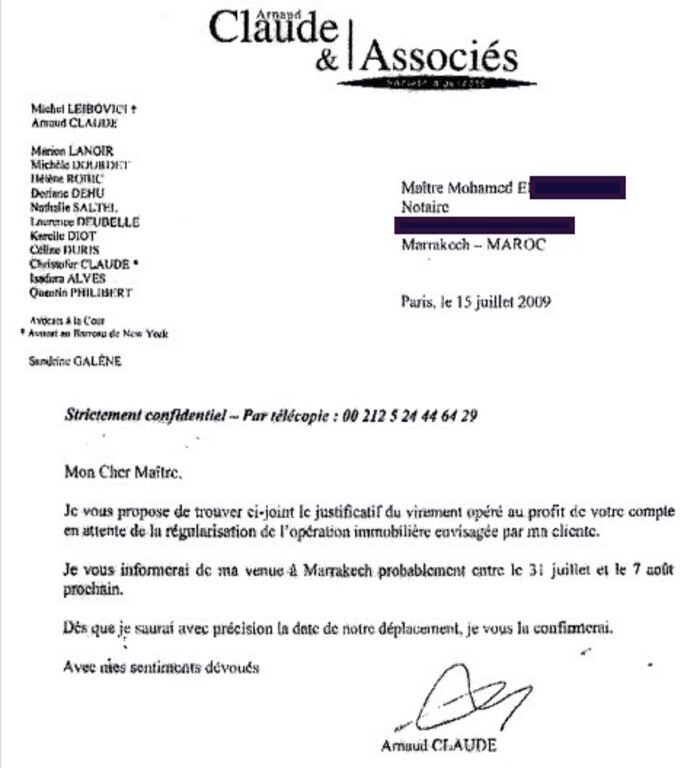Paris-based investigating magistrates have established that French lawyer Arnaud Claude, a longstanding friend of Nicolas Sarkozy’s with whom the former French president founded in 1987 the Paris law firm Claude & Sarkozy, played an “active role” in the creation of an offshore tax-evading structure for one of Sarkozy’s staunchest political allies, veteran conservative Member of Parliament Patrick Balkany.
Arnaud Claude, who recently stepped back from the legal practice in which Sarkozy remains an active partner, has already, in December 2014, been placed under investigation (a French legal status one step short of being charged but which indicates the existence of “serious or concordant evidence” of criminal activity) for “money laundering the proceeds of tax evasion”.

Enlargement : Illustration 1

The judicial investigation in which Claude (pictured right) is cited centres on Patrick Balkany and his wife Isabelle who are suspected of hiding their ownership of several overseas properties from the French tax authorities, and notably of a luxurious property in Morocco, estimated to be worth more than 5 million euros.
Balkany, a Member of Parliament (MP) for a constituency in Levallois-Perret, a suburb west of Paris of which he is also mayor, has been placed under investigation for tax fraud, corruption, money laundering and giving a false declaration of his wealth in the parliamentary register of MPs’ assets. His wife, who is deputy mayor of Levallois-Perret, is also under investigation for money laundering.
A longstanding and outspoken political ally of Nicolas Sarkozy’s, Balkany has long reigned as mayor of Levallois-Perret during two terms of office - firstly from 1983-1995, then from 2002 until now – marked by corruption and scandal. In 1996 he was handed a suspended jail sentence, a fine and a two-year ban on holding public office after it was discovered that three town hall employees, paid out of public funds, were used as full-time domestic staff by him and his wife in their Levallois-Perret apartment home and Normandy mansion. Isabelle Balkany was given the same sentence.
Claude, who has provided legal services to the Levallois-Perret municipality since the early 1980s, is suspected of having organised a structure of offshore companies to hide the Balkany couple’s ownership of a luxurious riad in the Moroccan town of Marrakesh. The couple, both aged 68, have insisted that they rent the property, Dar Gyucy, which is officially owned by a Panama-based company called Hayridge Investment Group Corp., registered in Panama in 2007 by the Panamanian law firm Mossack Fonseca, which was the subject of the so-called Panama Papers leaks earlier this year.
Mediapart has gained access to case notes written in July by the two magistrates leading the judicial investigation, judges Renaud Van Ruymbeke and Patricia Simon, after completing their investigations in Morocco in June. The magistrates refer to evidence of Arnaud Claude’s “active role” in “the creation of a sophisticated structure” to mask the true ownership of the Marrakesh property, and ordered the judicial confiscation of the lawyer’s holiday home in Normandy, a 225-metre house with a swimming pool.
Claude, who did not respond to Mediapart’s request for an interview, has denied any involvement in helping the Balkany’s to mask their ownership of the Marrakesh riad, which was bought from a retired chemist shop owner in 2010.
The property was presented to Patrick and Isabelle Balkany in the spring of 2009 by two French estate agents, who were questioned by the magistrates. After the sale, one was paid a commission of 100,000 euros, the other 68,000 euros. One of them, Marc A (last name deliberately withheld here), gave a statement recounting the Balkany couple’s visit to the villa to negotiate the purchase price. “When they left, […] the Balkanys told us that two people would make contact with us and that they [would] look after the administrative problems with the notary,” he told the judges, naming them as “Mr Aubry” and “Mr Arnaud Claude”.
“Mr Aubry” is Jean-Pierre Aubry, 54, Patrick Balkany’s longserving aide at the Levallois-Perret town hall who, after becoming the mayor’s chief-of-staff, was appointed head of the suburb’s financial and property management unit, the Semarelp. He was also placed under investigation in 2014 on suspicion of serving as the frontman during the purchase of the villa via Panamanian shell corporations and a Swiss trust company.
Aubry and Claude travelled to Morocco two weeks after the Balkany couple’s visit in the spring of 2009. At the time Nicolas Sarkozy was French president, and the Paris law firm he had set up 22 years earlier with Claude and a third partner, lawyer Michel Leibovici, was called Arnaud Claude & Associés.
Questioned by judges Van Ruymbeke and Simon in June, Arnaud Claude said: “My intervention in this affair was purely amicable […] I accompanied Mr Aubry in order to try and understand what was happening on the question of the technical aspects of urbanism of the villa.” However, that version of events contradicts a statement given to the magistrates by Geneviève Euloge, a Morocco-based French specialist in foreign investments in Marrakesh, and also close to Sarkozy’s then-ruling UMP party (now renamed Les Républicains). She said that Claude and Aubry came to see her for advice on setting up a Moroccan property ownership company, called an SCI (société civile immobilière) in French. “Mr Arnaud Claude and Mr Aubry said to me that they wanted a Panamanian company to be owner of [...] a Moroccan SCI,” Euloge said, minimising the role of Aubry who she said appeared “as someone who was in charge of building work”.
Euloge subsequently helped Claude with the creation of the SCI. In an email to the lawyer dated June 25th 2009, held as evidence in the case and seen by Mediapart, she sent details of “the preliminary project for the SCI”, writing “here are the documents you asked me for”. When the time came to choose the name of the villa, she advised “that which Maître Claude has given”, Dar Gyucy.

The judges asked Claude about Geneviève Euloge’s comment on the naming of the villa. “I have no memory of giving that name,” Claude told them, as recorded in the case file. The magistrates suggested to him that the second word in the villa’s name, Dar Gyucy (Dar being the phonetic translation of the Arabic for “abode”), was a reference to the first names of Patrick and Isabelle Balkany’s grandchildren, Gyula and Lucie. “I’ve never had the privilege of being presented to Mr Balkany’s grandchildren,” replied Claude.
The retired chemist who sold the villa, Mohammed B (last name deliberately withheld here) was also questioned by the magistrates. The agreed total sum of the transaction was 5.25 million euros, of which 2.75 million euros were to be officially declared before the notary, with the remaining 2.5 million euros to be secretly paid into an account opened in the vendor’s name in Lebanon.
In early 2015 the magistrates established that first instructions for the secret payment originated from a document sent by a fax machine situated within the offices of Claude & Sarkozy, at 52, boulevard Malesherbes in central Paris. The sum was paid out of a bank account in Singapore held in the name of Jean-Pierre Aubry.

Enlargement : Illustration 3

In a statement given to the magistrates, Mohammed B said it was Arnaud Claude who intervened directly with him on the question of a secret payment. “Arnaud Claude came to find me,” the retired chemist told the magistrates in a statement seen by Mediapart. “He insisted that a part of the [sale price] be paid in ‘black’ in Lebanon and that only a part of the price be declared at the notary’s. So I opened an account in Lebanon.”
During the questioning, the judges asked: “To whom did you give the RIB [editors note: bank account details] for the Lebanese account?”
“To Arnaud Claude,” replied Mohammed B.
“Was Arnaud Claude your only interlocutor for the transfer?” the magistrates asked.
“Yes,” replied Mohammed B.
Arnaud Claude has denied Mohammed B’s account, and has told the magistrates that he has never placed a foot in the villa.

Meanwhile, the Moroccan notary who oversaw the ‘official’ transaction of the sale, for 2.75 million euros, told the magistrates that it was Claude who asked him for his practice’s bank account details. The notary, Mohamed E (last name deliberately withheld) provided the investigators with a fax he received from Claude on July 15th 2009 (see document reproduced right), in which the Parisian lawyer sent confirmation of the imminent arrival of the agreed sum.
Mohamed E described Claude’s role in the transaction as that of “leading the operations”. He said that on the day of the final signature for the sale at his offices, on January 8th 2010, he could not recall the presence of Jean-Pierre Aubry or Patrick Balkany, but he did recall that of of Arnaud Claude.
The magistrates appear to believe they have found trace of fees paid to Claude for his role in the villa’s purchase, in the form of a 200,000-dollar transfer from a shell company headed by Jean-Pierre Aubry into a Singapore bank account in the name of one of the lawyer’s nephews. The Swiss trust company that ordered the transfer described the operation as “a part of fees”.
Claude claimed that the sum in question was for a “study or consultation” carried out by his nephew, a banker specialised in Far-East financial markets, and which was carried out “on behalf of Mr Aubry”. The Singapore-based nephew, summoned in vain by the magistrates to appear before them earlier this year with a view to placing him under investigation for “money laundering the proceeds of tax fraud”, instead sent them a 150-page document written in English on the subject of the Chinese energy sector, which he presented as being the substance of the work commissioned by Jean-Pierre Aubry in 2010.
-------------------------
- The French version of this article can be found here.
English version by Graham Tearse


